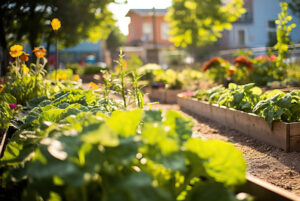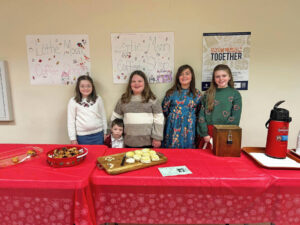By Tony Martin
Associate Editor
The Gate of the Year is the popular name of a poem by Minnie Louise Haskins. However, the poem as written by Haskins is formally titled, God Knows.
Here’s a quick history lesson. According to Wikipedia, the poem was written in 1908 and privately published in 1912. King George VI quoted it in his 1939 Christmas broadcast to the British empire. It was thought that his wife, Queen Elizabeth, the Queen Consort, shared Haskins’ poem with him. Now it’s believed that Princess Elizabeth, age 13, showed the poem to her father.
The Gate of the Year gave comfort to the Queen Mother all her days, and was a real inspiration to Brits in the Second World War. She had its words engraved on stone plaques and mounted on the gates of the King George VI Memorial Chapel at Windsor Castle.
This is the best-known stanza:
And I said to the man who stood at the gate of the year:
“Give me a light that I may tread safely into the unknown.”
And he replied:
“Go out into the darkness and put your hand into the Hand of God.
That shall be to you better than light and safer than a known way.”
So I went forth, and finding the Hand of God, trod gladly into the night.
And He led me towards the hills and the breaking of day in the lone East.
So why this current fascination on my part? Let me parse it.
And I said to the man who stood at the gate of the year: “Give me a light that I may tread safely into the unknown.”
Here are two fundamental wishes. These are especially meaningful when you have some hard questions and the answers aren’t forthcoming. (Hello, 2021!) The desire for light is self-evident. You want to be able to see where you’re going.
Tread safely into the unknown.
If light is available, then the unknown isn’t quite as scary. In these dark days, if you knew what lay ahead wouldn’t you be comforted by knowing? (Or not; if what lay ahead is disastrous, you might not want to know.)
There have been times in my life – and, in all likelihood, yours too – when you took a leap of faith and hit the ground with a sickening thud. Your faith was misplaced. You let the clamor of the world drown out that still, small voice or worse, you “followed your heart.” Ancient script teaches that the heart is deceitful above all things. Following your heart sounds noble, but it’s not a good idea.
You’ve probably said things like:
- I thought God wanted me to marry him.
- I thought I was supposed to take that job.
- Moving to a new house felt right, somehow.
Here’s the lesson:
- It’s not a matter of removing the darkness. It’s a matter of accepting the darkness and prevailing in it.
- God’s hand is big, protective, and firm. He doesn’t let go of you. People might. He won’t.
- If it’s safety you crave, then the most perfectly safe place in the universe is in the hand of God, and it doesn’t matter how dark it is.
So I went forth, and finding the Hand of God, trod gladly into the night.
Here’s a subtle nuance. The picture is of someone (you? me?) moving first and then finding the hand of God. It’s knowing that He’s already there, whether you have reached Him or not. The poet draws the picture of taking God’s hand and trodding gladly into the night. No fear, no apprehension. Just the simple joy of knowing God’s got you.
It doesn’t matter the circumstances of what brought on the darkness. Those might not change. The mandate is to be glad in those circumstances. Crazy, I know. However, it all is centered in God holding your hand.
And He led me towards the hills and the breaking of day in the lone East.
Get this picture:
- God leads, and the journey begins in darkness.
- He leads toward the hills. Hills conceal, but there is the promise of something else beyond what can be seen at the moment.
- The day breaks in the East. There is the certainty of sunrise and, blessedly, visual confirmation that it is indeed dawn. A new day with new possibilities and new hope.
The Gate of the Year
So heart be still:
What need our little life
Our human life to know,
If God hath comprehension?
In all the dizzy strife
Of things both high and low,
God hideth His intention.
God knows. His will
Is best. The stretch of years
Which wind ahead, so dim
To our imperfect vision,
Are clear to God. Our fears
Are premature; In Him,
All time hath full provision.
Then rest: until
God moves to lift the veil
From our impatient eyes,
When, as the sweeter features
Of Life’s stern face we hail,
Fair beyond all surmise
God’s thought around His creatures
Our mind shall fill.








